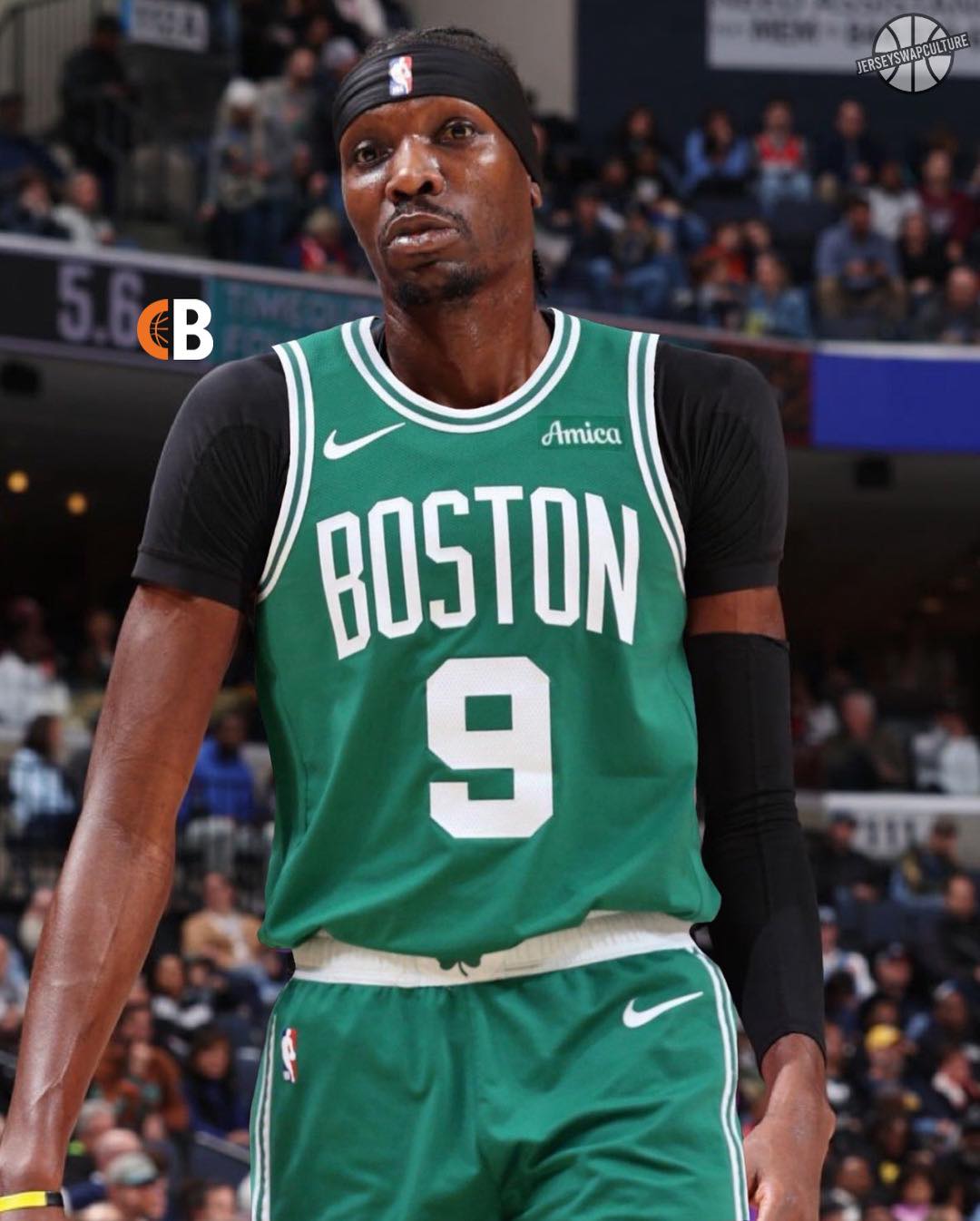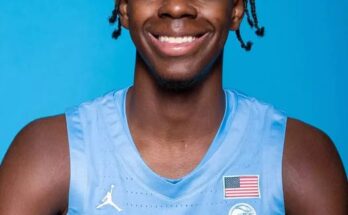In a significant yet financially savvy roster move, the Boston Celtics have signed free agent forward Chris Boucher to a one-year contract worth \$3.3 million. The deal, fully guaranteed, signals an intentional shift in the Celtics’ approach as they navigate the upcoming NBA season with a combination of competitive ambition and strategic restraint. Chris Boucher, a 6’9” forward with a lean frame and unique two-way skill set, represents both experience and versatility—two traits the Celtics are betting on as they reconfigure a roster that has undergone meaningful changes in recent months.
This signing comes on the heels of the Celtics’ decision to trade veteran forward Georges Niang and two future second-round picks to the Utah Jazz in exchange for rookie RJ Luis Jr. That trade, primarily motivated by financial considerations, cleared approximately \$8.2 million from Boston’s payroll. It gave the Celtics breathing room beneath the second tax apron—a threshold that has increasingly become a limiting factor for contenders attempting to retool while remaining fiscally responsible under the NBA’s evolving collective bargaining agreement. By executing this dual move—clearing Niang’s salary and signing Boucher at a reduced cost—Boston not only improves its frontcourt flexibility but also avoids steep luxury tax penalties, which could have soared had the team kept Niang and added additional players.
Chris Boucher is no stranger to overcoming odds. Born in Saint Lucia and raised in Montreal, Canada, Boucher’s path to the NBA was anything but conventional. He went undrafted in 2017 after a strong college career at Oregon, where he earned All-Pac-12 honors and made his name as an elite shot blocker. After bouncing around on two-way contracts and developing in the G League, Boucher eventually carved out a meaningful role with the Toronto Raptors. His breakthrough season came in 2020–21, when he averaged 13.6 points, 6.7 rebounds, and 1.9 blocks per game. While those numbers have since dipped due to evolving roles and roster shifts in Toronto, Boucher has consistently proven himself to be an effective contributor off the bench.
Last season, Boucher averaged approximately 10.0 points and 4.5 rebounds in 17 minutes per game while shooting 49.2 percent from the field and a respectable 36.3 percent from three-point range. His ability to stretch the floor on offense and protect the rim on defense makes him a rare commodity—an energy big man who can switch defensively, rebound effectively, and contribute on both ends without needing high usage. He’s not a traditional center, nor is he a true small forward, but that in-betweener quality is exactly what makes him valuable in the modern NBA. For the Celtics, he represents a plug-and-play option who can slot into various lineup configurations and provide needed depth behind stars like Jayson Tatum and Jaylen Brown.
What’s particularly compelling about this acquisition is how well it aligns with the Celtics’ broader strategic outlook. President of Basketball Operations Brad Stevens has spent the last few seasons carefully managing the team’s cap sheet while assembling a competitive, resilient roster. The goal isn’t merely to compete every year—it’s to build sustainable success around a core that includes Tatum, Brown, Derrick White, and Kristaps Porzingis. With Tatum currently recovering from an Achilles injury that could impact the early portion of the season, the Celtics are leaning into roster flexibility, hoping to bridge the gap with smart, affordable signings that don’t compromise the team’s long-term vision. Boucher, at just over \$3 million, is a low-risk, high-upside move that fits this mold perfectly.
From a basketball standpoint, Boucher’s fit in Boston is easy to envision. He offers much of what the Celtics lost in Niang but with greater athleticism and defensive potential. While Niang was known for his shooting and veteran savvy, his defensive limitations and lack of mobility often made him a liability in switch-heavy schemes. Boucher, on the other hand, can cover more ground defensively, contest shots at the rim, and still knock down open jumpers on the other end. His unorthodox style—marked by quick second jumps, lanky reach, and high energy—adds a dynamic element to Boston’s second unit. He can operate as a small-ball center in certain lineups or play alongside another big like Porzingis or Neemias Queta, depending on matchups.
In many ways, Boucher also brings championship DNA to a team that is still basking in the glow of its 2024 NBA title run. As the last remaining member of the Raptors’ 2019 championship team, Boucher understands what it takes to win at the highest level. While he wasn’t a featured player during that run, his experience in a title-winning culture has value—particularly for a Celtics team that’s trying to maintain its edge amid roster churn and high expectations. He brings humility, work ethic, and professionalism to the locker room, all qualities that have defined his journey from the G League to NBA relevance.
Off the court, Boucher has built a reputation as a quiet leader and model teammate. Coaches praise his commitment to staying ready and contributing in whatever role is asked of him. He rarely complains about minutes, understands defensive schemes well, and has shown a willingness to adapt his game to suit team needs. That mentality should endear him to head coach Joe Mazzulla, who often relies on player buy-in and defensive discipline as core tenets of his system. Mazzulla prefers players who compete on every possession, rotate correctly on defense, and create spacing on offense without disrupting flow. Boucher checks all of those boxes, especially in his ability to stay active without dominating the ball.
One underrated aspect of this move is how it positions Boston to remain agile throughout the season. With Boucher on a one-year deal and no long-term financial commitments attached, the Celtics can evaluate his fit over the course of the year without jeopardizing future flexibility. If he plays well, he becomes a candidate for an extension or a re-signing next summer. If not, they lose nothing significant. This deal also allows Boston to preserve its draft capital and trade exceptions for more impactful mid-season moves should the need arise. Essentially, Boucher is a no-risk addition with plenty of potential upside and virtually no downside.
From a fan perspective, the reaction to Boucher’s arrival has been largely positive. Celtics faithful have come to trust Brad Stevens’ front office acumen, and the signing fits a broader pattern of intelligent, low-key moves that prioritize fit and value over flash. Social media lit up with praise for Boucher’s work ethic and fit with Boston’s core players, and many noted his strong performances against the Celtics in previous seasons—where his energy, length, and shooting often stood out. In fact, some fans recalled specific games where Boucher’s presence helped keep Toronto competitive against Boston, making this acquisition feel even more strategic.
Looking ahead, Boucher’s role on the Celtics could evolve depending on injuries and performance. With Porzingis and Al Horford both managing physical wear and tear, and with the team likely to pace themselves early in the season, Boucher may see more minutes than expected. If he thrives in that expanded role, the Celtics could find themselves with a rotation piece who exceeds expectations and becomes a key part of their playoff push. At the very least, he provides a proven alternative to small lineups, allowing Boston to maintain rim protection and rebounding without sacrificing offensive spacing.
In the bigger picture, the Boucher signing underscores a deeper theme for the Celtics this offseason: transition with purpose. Rather than chasing splashy trades or overpriced free agents, Boston is building around its strengths, reinforcing its depth, and maintaining financial and roster flexibility for the long haul. With a franchise cornerstone like Tatum recovering and a championship window still wide open, the Celtics are threading the needle between present competitiveness and future preparedness. Chris Boucher, with his team-friendly deal, playoff experience, and two-way versatility, embodies that approach in full.
In a league where cap space is precious and every roster spot must be maximized, the Celtics’ decision to trade Niang, clear cap room, and bring in Boucher reflects an increasingly disciplined philosophy. This is a franchise that understands how fragile title contention can be and how important it is to surround stars with the right complementary pieces. Boucher isn’t a headliner, but he could be a quiet difference-maker—a veteran who plays his role, stays ready, and elevates the team in ways that don’t always show up in box scores.
Ultimately, time will tell how successful this move turns out to be. But for now, it’s clear that Boston has added a player who fits the system, matches the culture, and contributes to the team’s overarching goals without creating financial strain or locker room friction. In Chris Boucher, the Celtics have found more than just a role player—they’ve added a pro’s pro, a proven competitor, and a bridge between where they’ve been and where they want to go. And in a season that promises new challenges and continued evolution, that might be exactly what they need.



